
Angola, officially the Republic of Angola, is a country on the west-central coast of Southern Africa. It is the second-largest Lusophone (Portuguese-speaking) country in both total area and population and is the seventh-largest country in Africa. It is bordered by Namibia to the south, the Democratic Republic of the Congo to the north, Zambia to the east, and the Atlantic Ocean to the west. Angola has an exclave province, the province of Cabinda, that borders the Republic of the Congo and the Democratic Republic of the Congo. The capital and most populous city is Luanda.

Mozambique, officially the Republic of Mozambique, is a country located in southeast Africa bordered by the Indian Ocean to the east, Tanzania to the north, Malawi and Zambia to the northwest, Zimbabwe to the west, and Eswatini and South Africa to the southwest. The sovereign state is separated from the Comoros, Mayotte and Madagascar by the Mozambique Channel to the east. The capital and largest city is Maputo.

Portugal, officially the Portuguese Republic, is a country located on the Iberian Peninsula, in Southwestern Europe, and whose territory also includes the Macaronesian archipelagos of the Azores and Madeira. It features the westernmost point in continental Europe, its mainland west and south border with the North Atlantic Ocean and in the north and east, the Portugal-Spain border constitutes the longest uninterrupted border-line in the European Union. Its archipelagos form two autonomous regions with their own regional governments. In the mainland, Alentejo region occupies the biggest area but is one of the regions in Europe with a lower population density. Lisbon is the capital and largest city by population, being also the main spot for tourists alongside Porto and Algarve.
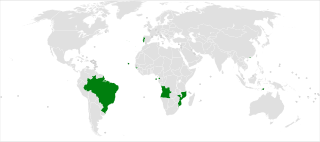
Portuguese is a Western Romance language of the Indo-European language family, originating in the Iberian Peninsula of Europe. It is the official language of Portugal, Brazil, Cape Verde, Angola, Mozambique, Guinea-Bissau and São Tomé and Príncipe, while having co-official language status in East Timor, Equatorial Guinea, and Macau. Portuguese-speaking people or nations are "Lusophones". As the result of expansion during colonial times, a cultural presence of Portuguese speakers is also found around the world. Portuguese is part of the Ibero-Romance group that evolved from several dialects of Vulgar Latin in the medieval Kingdom of Galicia and the County of Portugal, and has kept some Celtic phonology.

Porto, also known as Oporto, is the second largest city in Portugal after Lisbon. It is the capital of the Porto District and one of the Iberian Peninsula's major urban areas. Porto city proper, which is the entire municipality of Porto, is small compared to its metropolitan area, with an estimated population of just 237,559 people in a municipality with only 41.42 km2 (16 sq mi). Porto's metropolitan area has around 1.7 million people (2021) in an area of 2,395 km2 (925 sq mi), making it the second-largest urban area in Portugal. It is recognized as a global city with a Gamma + rating from the Globalization and World Cities Research Network.
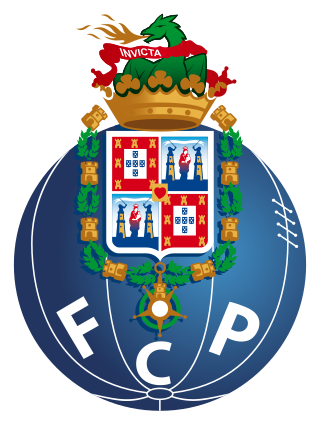
Futebol Clube do Porto, MHIH, OM, commonly known as FC Porto or simply Porto, is a Portuguese professional sports club based in Porto. It is best known for the professional football team playing in the Primeira Liga, the top flight of Portuguese football.

The 2004 UEFA European Football Championship, commonly referred to as Euro 2004, was the 12th edition of the UEFA European Championship, a quadrennial football competition contested by the men's national teams of UEFA member associations. The final tournament was hosted for the first time in Portugal, from 12 June to 4 July 2004. A total of 31 matches were played in ten venues across eight cities – Aveiro, Braga, Coimbra, Guimarães, Faro/Loulé, Leiria, Lisbon, and Porto.

Sport Lisboa e Benfica, commonly known as Benfica, is a professional football club based in Lisbon, Portugal, that competes in the Primeira Liga, the top flight of Portuguese football, where they are the current champions.
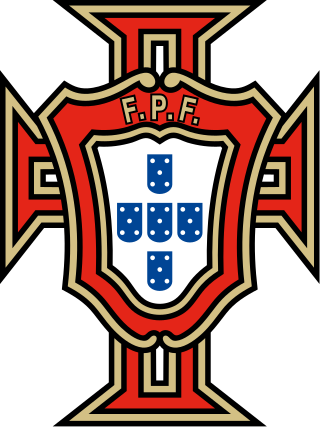
The Portugal national football team has represented Portugal in men's international football competition since 1921. The national team is controlled by the Portuguese Football Federation (FPF), the governing body for football in Portugal. Portugal's home matches are played at various stadiums throughout Portugal, and its primary training ground and technical headquarters, Cidade do Futebol, is located in Oeiras. The head coach of the team is Roberto Martínez, and the captain is Cristiano Ronaldo, who also holds the team records for most caps and most goals.

Anderson Luís de Souza, also known as Deco, is a former professional football player who primarily played as an attacking or central midfielder. Born and raised in Brazil, he acquired Portuguese citizenship and played for Portugal. He is regarded as one of the best midfielders of his generation. He currently works as sporting director in Barcelona.

Boavista Futebol Clube, commonly known as Boavista, is a Portuguese professional sports club from the city of Porto. Founded on 1 August 1903 by British entrepreneurs and Portuguese textile workers, it is one of the oldest clubs in the country and plays in the Primeira Liga, Portuguese football's top flight.
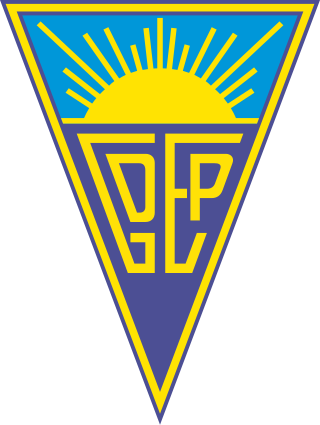
Grupo Desportivo Estoril Praia, commonly known as Estoril, is a Portuguese professional sports club from Estoril, Cascais, Lisbon. Founded on 17 May 1939, its football team currently plays in Primeira Liga and hold home games at the Estádio António Coimbra da Mota, with a seating capacity of 8,015. As a sports club, Estoril has departments for football, futsal and basketball.
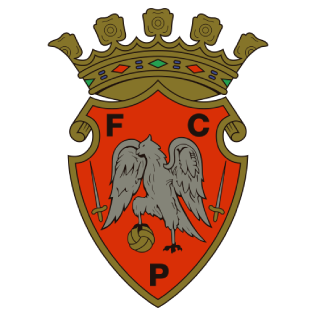
Futebol Clube de Penafiel is a Portuguese football club founded on 8 February 1951 and based in the city of Penafiel.

The Iberian Union was the dynastic union of Spain and Portugal, and of their respective colonial empires, that existed between 1580 and 1640 and brought the entire Iberian Peninsula except Andorra, as well as Portuguese and Spanish overseas possessions, under the Spanish Habsburg monarchs Philip II, Philip III, and Philip IV. The union began after the Portuguese crisis of succession and the ensuing War of the Portuguese Succession, and lasted until the Portuguese Restoration War, during which the House of Braganza was established as Portugal's new ruling dynasty with the acclamation of John IV as the new King of Portugal.

Uruguayan Portuguese, also known as fronteiriço and riverense, and referred to by its speakers as portunhol, is a variety of Portuguese in South America with heavy influence from Rioplatense Spanish. It is spoken in north-eastern Uruguay, near the Brazilian border, mainly in the region of the twin cities of Rivera (Uruguay) and Santana do Livramento (Brazil). This section of the frontier is called "Peace Border", because there is no legal obstacle to crossing the border between the two countries.
The 2003–04 Primeira Liga was the 70th edition of top flight of Portuguese football. It started 16 August 2003 with an opening game between Académica de Coimbra and Sporting Clube de Portugal, and ended on 9 May 2004. It was contested by 18 teams. FC Porto were the defending champions and became champions again, winning the Portuguese title in two consecutive seasons.
The 2004–05 Taça de Portugal was the 65th edition of the Portuguese football knockout tournament, organized by the Portuguese Football Federation (FPF). The 2004–05 Taça de Portugal began on 5 September 2004. The final was played on 29 May 2005 at the Estádio Nacional.
The 2003–04 Taça de Portugal was the 64th edition of the Portuguese football knockout tournament organized by the Portuguese Football Federation (FPF). This edition of the Taça de Portugal began on 7 September 2003, and concluded on 16 May 2004 with the final at the Estádio Nacional.

The Barbado da Terceira is Portuguese breed of herding and guard dog from the Atlantic island of Terceira in the Azores, for which it is named. It was recognised by the Direcção-Geral de Veterinária of Portugal in 2004. It is not recognised by the Fédération Cynologique Internationale.

Luís Filipe Madeira Caeiro Figo is a Portuguese former professional footballer who played as a winger for Sporting CP, Barcelona, Real Madrid and Inter Milan. He won 127 caps for the Portugal national team, a one-time record, and is considered one of the greatest players of his generation.


















